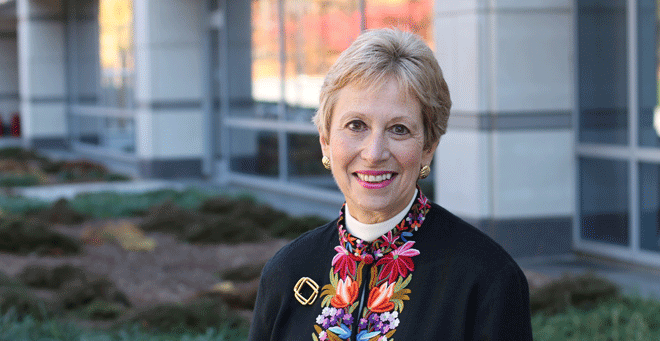 |
|
|
“This is a significant enhancement to the Graduate School of Nursing curriculum," said GSN Dean Joan Vitello. |
UMass Medical School is expanding its new opioid conscious curriculum to the Graduate School of Nursing, making it the first in Massachusetts to ensure both its medical and nursing professionals are sound prescribers trained to mitigate the dangers associated with opioid therapy.
“Our commitment as the state’s only public medical school is that every Graduate School of Nursing graduate, along with every School of Medicine graduate, will be given the tools necessary to deal with the complex and novel interplay of prescription drug abuse, drug dependency and the desperation of people facing addiction,” said Terence R. Flotte, MD, the Celia and Isaac Haidak Professor of Medical Education, executive deputy chancellor, provost and dean of the School of Medicine. “Ours is the first medical school in the state to implement these enhancements to our curriculum in the current academic year, and the only medical school in the commonwealth to include advanced practice nursing graduates.”
“This is a significant enhancement to the Graduate School of Nursing curriculum and is intended to prepare future advanced practice nurses to capably and consciously address the growing public health crises of opioid abuse and dependence,” said Joan Vitello, PhD, dean of the Graduate School of Nursing.
The GSN’s class of 2016 includes an anticipated 50 advanced practice nursing graduates, who will join 125 School of Medicine students in this required training. In Massachusetts, nurse practitioners are licensed prescribers.
Since Massachusetts Gov. Charlie Baker asked the state’s four medical schools to work with representatives of the Massachusetts Medical Society and the state’s Department of Public Health to reach consensus on educational tools and competencies that will help providers face the growing epidemic of prescription drug abuse last fall, UMass Medical School has responded with a sense of urgency, galvanized by the need to bring new approaches and new tools to a public health crisis that is claiming too many lives and destroying too many families, Dean Flotte said.
“The initial phase of our Opioid and Safe Prescribing Training Immersion program will provide both training and assessment of our students’ skills. We have begun to design a series of required, hands-on, skills building training sessions in our cutting-edge simulation center, which is the gold standard for competency evaluation of medical students. The training, which bolsters existing classroom learning, is targeted to opioid safe prescribing and prescription drug misuse prevention and treatment,” said Michele Pugnaire, MD, senior associate dean for educational affairs and professor of family medicine & community health.
The program addresses all 10 specific core competencies established by the Governor’s Medical Education Working Group on Prescription Drug Misuse and ensures that all UMMS graduates are optimally prepared as sound prescribers and are trained in the screening, prevention and management of prescription drug misuse, Pugnaire said.
By working with faculty experts across disciplines, UMMS is developing interprofessional teaching scenarios to address specific competencies, with a particular focus on skills development such as observational skills; communication and interpersonal dynamics; prescription planning and writing; patient education and counseling; and effective use of tools such as drug urine screening and evidence-based screening. Importantly, individual feedback and skills assessment, as well as a group debriefing, are included. UMass Medical School has been a leader in establishing gold standards for effective competency-based medical education and achievement of skills.
Related Links on UMassMedNow:
UMMS implements curriculum changes in current academic year to address opioid crisis
UMMS working with other Mass. medical schools, governor on opioid prescribing practices
Gov. Baker names UMMS pharmacy director to Opioid Drug Formulary Commission
Paul Jeffrey to Fox-TV 25 Boston: We must expand opioid abuse treatment, prevention